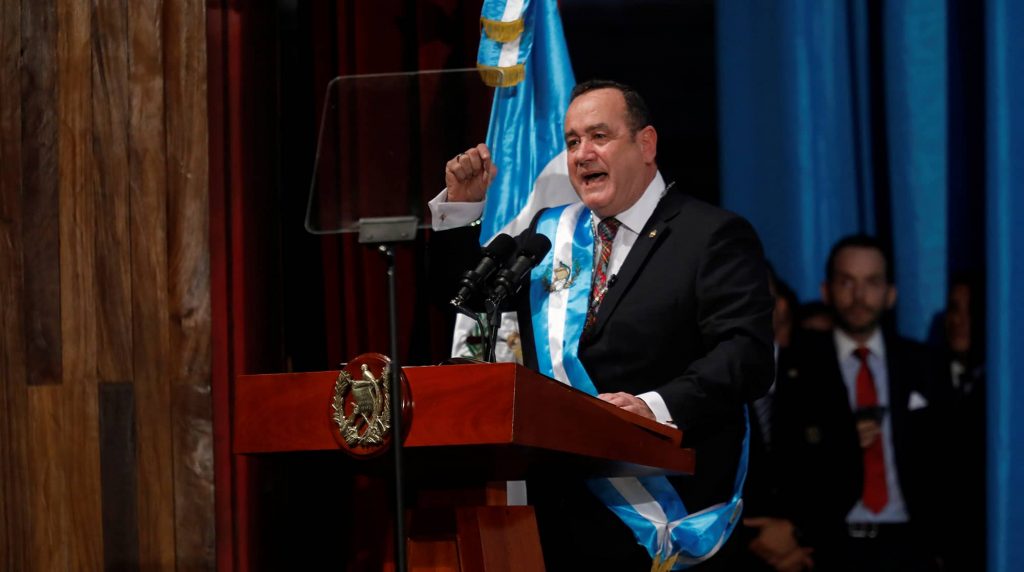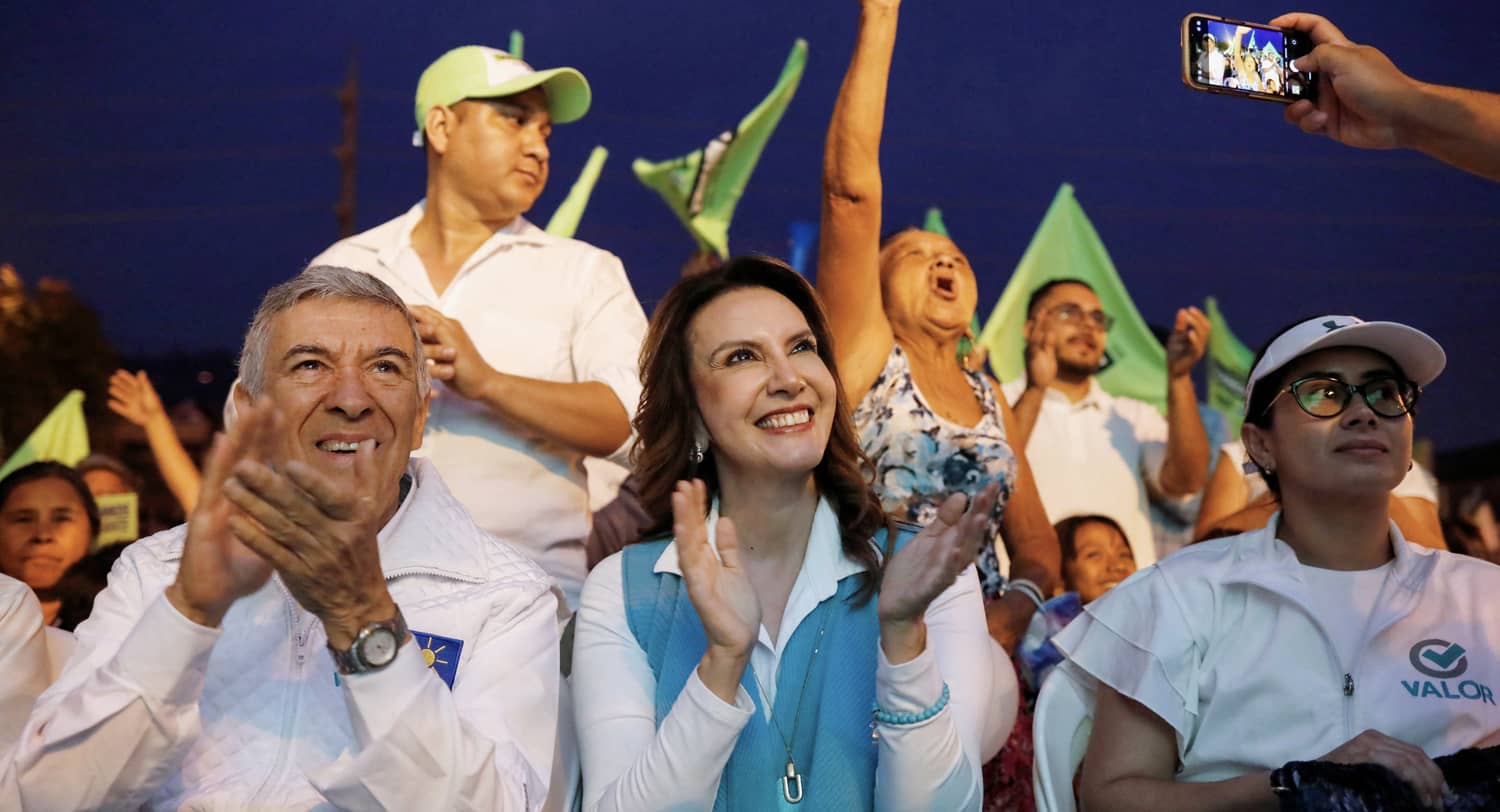On June 25, just over 9 million Guatemalans went to the polls to elect a president, vice president, members of congress, and municipal authorities. The results of the presidential race were inconclusive and a runoff is due in August. While Guatemalans have participated in elections since the end of military dictatorship in 1986, and one could assume that their democracy is becoming well established, the story behind Guatemala’s elections is complicated.
The June elections are likely to represent a further step in the country’s march toward illiberal democracy and even authoritarian rule. Guatemala’s elections may serve as a warning sign to other countries where corruption and politicized institutions erode democratic practices.
A Small State in a Crucial Neighborhood
Guatemala has the largest population and economy in Central America, located on the Mesoamerican land bridge between South and North America. Each year, hundreds of thousands of migrants must travel through the country, on Mexico’s southern border, en route to the United States. It is an important pathway not only for economic goods and services, but also for criminal networks and illicit economies such as narcotics, firearms, human smuggling and money laundering.
Guatemala is also the most diverse country in the region with 24 ethnic groups and 6.5 million people belonging to 22 Mayan groups (representing 44 percent of the population). Twenty-two Mayan languages are spoken as well as Xinca, Garifuna, and Spanish.
Inequality is deeply rooted in Guatemalan society with poverty, hunger, lower educational attainment and poor health indicators heavily concentrated among indigenous people. According to the World Bank, “Guatemala’s poverty and inequality rates are among the highest in the Latin American and Caribbean region, driven by the existence of a large and underserved population, mostly rural and Indigenous and employed in the informal sector.” The World Food Program estimates that 79% of Guatemala’s Indigenous peoples live in poverty (compared to a 54% poverty rate overall) and 40% of those in poverty live in extreme poverty. Fifty percent of children under the age of five are malnourished, with the rate reaching a staggering 80% is the majority Mayan highlands of western Guatemala, according to UNICEF.
A Captured Democracy
The end of military rule in 1986 ushered in a period of fragile civilian governments still dominated by former military officers linked to organized crime, which compromised the desire of most Guatemalans to consolidate democratic gains. In Guatemala, there are no historic parties of the left or right but rather competing economic and political elites who negotiate and reach agreements that guarantee their grip on power. By 2004 the power of these groups had grown so much that the country agreed to invite the United Nations to establish an independent body to work with the justice system and bring criminal cases against corrupt actors in and out of government.
Beginning in 2005, the UN mechanism, known as the International Commission against Impunity in Guatemala, was established and began strengthening the capacities of Guatemalan prosecutors and judges to successfully investigate and prosecute corrupt actors. The International Commission gradually empowered Guatemala’s judicial system to the point that a joint investigation led, in 2015, to the downfall of Guatemala’s then-president and vice-president, who were both eventually convicted of corruption. Tens of thousands of Guatemalans from all walks of life took to the streets to celebrate these accomplishments.
Sadly, these advances faltered when the International Commission turned its attention to the use of illicit campaign contributions to support the next president, Jimmy Morales, elected in 2016. Some of those cases involved the most powerful families in Guatemala. Morales eventually decided not to renew the Commission’s mandate and declared the Commissioner in charge persona non grata, leading to the shuttering of its offices in September 2019.
Court testimony exists linking President Alejandro Giammattei to bribes made by construction companies seeking “no bid” contracts from the government. But the judge and anti-corruption prosecutor overseeing the case have been unable to complete their investigation because they were forced into exile after Giammattei fired and replaced the Attorney General.
Several former politicians and authorities have been prosecuted in the United States including former presidential candidate Mario Estrada, sentenced to 15 years in the United States, and Manuel Baldizón, another former presidential candidate sentenced to 50 months in the US for money laundering. According to the US Attorney, “Baldizon Mendez accepted campaign contributions knowing they were being made by narcotics traffickers and were the proceeds of narcotics trafficking.”

Presidential Elections Under the Microscope
The Supreme Electoral Tribunal is charged with safeguarding the election process and has generally functioned as a technical body not a political player. Yet it has been increasingly questioned by civic groups and the international community for questionable decisions regarding candidate eligibility certification, a notoriously fraught process but exceptionally so in 2023.
Several important presidential candidates have been disqualified for relatively minor infractions of electoral rules, while others have been certified despite serious allegations of corruption and ties to drug trafficking. The current front-runner, Zury Rios, was certified for the 2023 process even though she was disallowed in previous elections because she is the daughter of General Efrain Rios Montt, the former Guatemalan de facto head-of-state who was convicted of genocide for his role in a “scorched earth” campaign against the Mayan community in the early 1980s. The Guatemalan constitution makes clear that no family member of a former head of state can run for president. She is running for president despite the constitutional prohibition.
Other questionable candidates have been certified. One recent poll suggested that Carlos Pineda has shot into the lead for the June 25 election. Pineda was Mario Estrada’s vice-presidential running mate in 2015. Pineda has reemerged as the presidential candidate of a new party, Citizen Prosperity, backed by Baldizon’s sons. Pineda himself is suspected of links to corrupt politicians and criminal interests.
Conversely, two previous presidential candidates have been disqualified for this election based on seemingly minor infractions. Telma Cabrera, with deep support within the Mayan community and the 4th place finisher in 2019, was disqualified when her running mate, Jordan Rodas, was found to have two unresolved complaints before the Comptroller General’s office stemming from his time as the country’s former human rights ombudsman. These alleged infractions have not been investigated.
In this context, the Organization of American States’ Secretariat for Strengthening Democracy expressed “concern about the process of registering candidates in Guatemala.” They noted, “… that hundreds of people have been excluded from the elections, some of them very high-profile and aspiring to the highest positions of popular election.”
The Rot in the Justice System
Four factors drive the weakness of Guatemala’s democracy: weak campaign finance controls; politicized election institutions; a co-opted justice system; and lack of space for independent voices such as journalists and civil society organizations. Together, these deficiencies have made it easier for corrupt and criminal interests to maintain control of the country while appearing to abide by basic democratic norms.
Guatemala’s justice system has been hollowed out by successive administrations bent on ensuring political loyalty rather than unbiased adherence to the law. The US Department of State has sanctioned numerous senior justice officials for ties to corruption and undemocratic activities including the current Attorney General, Consuelo Porras, and the lead prosecutor in her anti-corruption unit, Jose Curruchiche.
Guatemalan investigators and prosecutors have initiated numerous cases involving alleged illicit campaign finance but most of these have been interrupted by attacks against the judges and prosecutors overseeing the cases. Together, they have threatened dozens of high-ranking Guatemalan judges, prosecutors, and investigators overseeing cases of alleged high-level corruption and/or human rights abuses. Hundreds of administrative and criminal accusations made by allies of the country’s economic elite have been filed, and the AG’s office has used these to “criminalize” justice officials resulting in their involuntary exile or incarceration. One particular case involves Virgina Laparra, a former prosecutor in the AG’s anti-corruption unit. She has been incarcerated for 14 months, and Amnesty International declared Laparra a Prisoner of Conscience for peacefully carrying out her legitimate responsibilities.
Finally, institutional weaknesses are exacerbated when independent voices in the press and civil society are silenced. Like justice sector officials, dozens of independent journalists, anti-corruption activists, and human rights defenders have been threatened and attacked by political leaders and their allies in society. These threats are often anonymous, sometimes coming from unidentified online trolls with links to political actors.
One case involves the publisher of the daily El Periodico, José Rubén Zamora, a well respected and independent voice in Guatemala for years. Zamora has been incarcerated for nine months in a tiny windowless cell and allowed only 1 hour of fresh air and sunlight a day, and permitted two visits two times a week. He is currently incarcerated on alleged obstruction of justice and money-laundering charges. His lawyers and others in the anti-corruption movement that have collaborated with El Periodico have also been targeted in connection with Zamora and three of his lawyers are now incarcerated, and dozens of allies forced into exile. Meanwhile, El Periodico has been shuttered completely as of May 15.
A Dangerous Trend for the Region
To judge Guatemala’s 2023 elections solely on the basis of the integrity of the voting process is to miss the bigger picture of democratic decline. The context is a skewed electoral process where candidates are ruled in or out without regard to international and domestic standards and where powerful elites attack independent press and civil society.
Guatemala’s march towards illiberal democracy and authoritarianism reflects broader trends in Central America. Weak democratic institutions, ineffective and corrupt governments, and widespread violence are common throughout the region.
The United States has largely been silent on Guatemala despite clear warning signs of the growing risks of democratic decline and potential criminal cooptation of the state, perhaps out of fear that it will be accused of intervention. Thus it will be up to the citizens and civic organizations of Guatemala, many now in exile, to dig themselves out of this hole. The international community should also play a role; democracy requires the efforts of all that continue to believe in its promise.



